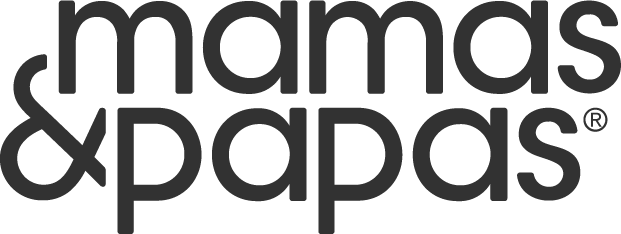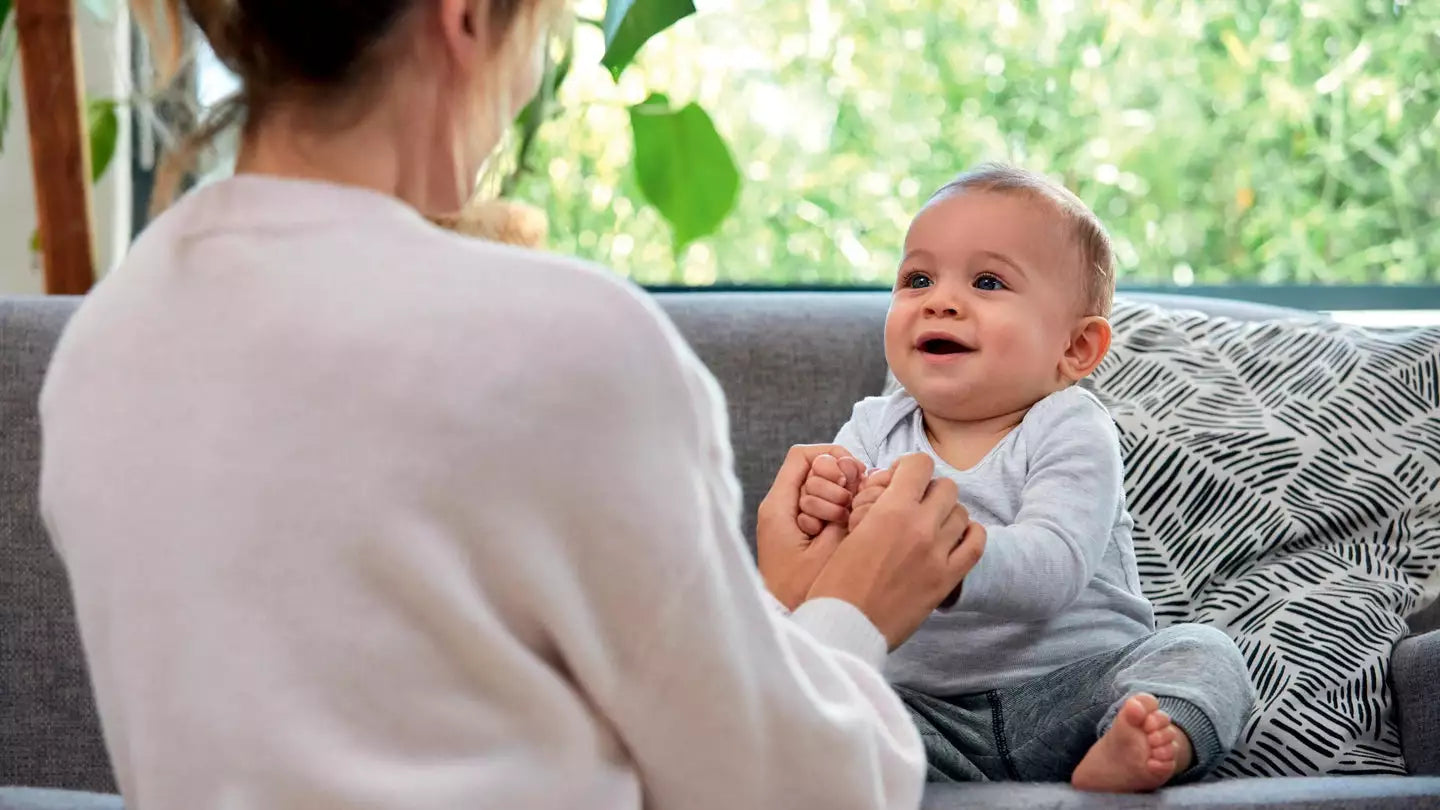From a coo or gurgle to a fully formed word, here’s everything you need to know about your baby’s speech and language development, including when they might hit those milestones and how you can help them along the way.
Of all the milestones a baby reaches, their first words are probably the most exciting for parents. For the little person, too, it’s pretty life-changing to finally be able to express that overwhelming desire for more milk, a cuddle with teddy or, perhaps more likely, no spinach.
From the first smiles to a full rendition of 'Twinkle, Twinkle', babies learn language through interaction with other people, so your role as a parent is huge. There’s no need to feel pressured, though – the process happens automatically. That said, there are things you can do to help your baby's speech develop more quickly and with more fun along the way.
Baby's Speech: Language acquisition

When does my baby start to understand language?
Language acquisition actually starts way before that much-hyped first word is uttered. “Talking goes back to the very early days,” says paediatric occupational therapist and baby development expert Fiona O’Farrell. “Those first engagements with your baby are so important.”
How can I help my newborn understand language?
Even with a newborn, there are things you can do to get the baby's speech ball rolling. “Initially your baby will only be able to see about eight inches in front of them,” explains Fiona. “So get in really close, and do lots of cooing and making facial expressions. That gets your baby to focus on your face and begins to win their attention and interest – both of which are a prerequisite long before your baby begins to talk.”
Baby's Speech: Laughing

When will my baby learn to laugh?
Few things incite that parental feeling of pure joy and love than seeing your baby’s first smiles and later hearing them giggle. “Babies usually start smiling and laughing between six and eight weeks old, and certainly by six months of age,” says paediatric speech and language therapist, Hannah Cadby.
How can I help my baby learn to laugh?
“Games that involve a 'punchline' or an element of anticipation, such as Peepo! or Round and Round the Garden are good for helping your baby develop their first chuckles,” says Hannah.
Baby's Speech: Cooing

When will my baby start cooing?
Soon you’ll hear those sweet baby's speech sounds as your little one tries out their first noises (aside from the very familiar foghorn of your newborn screaming, that is). “From birth to six months, babies begin to use open mouth sounds with a variety of different tones, known as cooing,” says Hannah.
“Babies quickly learn how to use coos and squeals to get your attention! This marks the beginning of experimentation with sounds made with the tongue and lips which develops into babbling, between six and 12 months, and then first words.”
How can I help my baby learn to coo?
Again, this stage will happen as a natural part of your little one's development, but you have a central role to play in encouraging baby's speech. “You can encourage this early experimentation by interacting with your baby," says Hannah, "using simple repetitive sounds, making eye contact and responding with smiles and praise.”

“My baby Ayah started to smile in her first few weeks of life. She was born prematurely by eight weeks, so seeing this while being with her in neonatal was so beautiful. She has also reacted with smiles and facial expressions when hearing her daddy’s voice. Ayah started making talkative cooing noises from three months, where she would try and lipread to mimic the movements.
Now, being a bubbly six-month-old, she has a lot more to say and a lot more to smile about. Conversations in baby language are the most adorable moments to experience.”
Sidra, 32, London
Baby's Speech: Understanding language

Does my baby understand what I say?
The first stage of baby language becoming obviously useful, rather than just cute, arrives between six and 12 months, when they start to understand what we say. “Now, babies can begin to turn to an adult calling their name and start to show understanding of words such as 'all gone' and ‘more’,” Hannah explains. “They may also begin to show recognition of very familiar objects such as spoon, cup or daddy. By two years old, children can usually follow instructions with two main parts, for example, 'make teddy jump', or 'find mummy's jumper’.” Time to put them to work!
How can I help my baby understand what’s being said?
To help your baby's speech along, Hannah suggests using facial expressions and simple gestures such as waving, pointing and lifting your hand to your mouth for 'drink', for example, to reinforce your baby's understanding of spoken words.
Mealtimes provide a great opportunity to practice baby's speech, says Fiona. “Give them the spoon and say ‘spoon’, so you’re associating the word with the object. Hold the object up to your mouth so your baby will look at your face, and will see you making the sounds. Really exaggerate how you’re saying the word.”
Baby's Speech: First words
When will my baby say their first word?
You can expect your baby to start uttering their first words at around 12 months. “They’ll usually start with words that are motivating or very familiar for them, like Mama, Dada, drink or dog,” says Hannah. All these words, along with ball, duck and that perennial toddler favourite. No!
How can I help my baby learn words?
Don't worry if your baby still sounds more like they’re babbling rather than speaking adult words. “Words won't always be recognisable at this stage,” Hannah explains. “You can help your baby by telling them the names of things they see every day. Using single words will help them to store those words more effectively than using sentences.”

“Annie has always been very chatty, but her first recognisable word came just after her first birthday when she started saying ‘shoes’. She also started saying 'Daddy' around the same time, which was the cutest thing and really hilarious since she called her mum Daddy, too.
The funniest bit was when her mum picked her up from the creche and she’d see her and shout 'DADDDDDDYYYYYY' in front of all the other parents. This went on for a couple of months before she finally got the hang of 'Mummy', which I was secretly quite disappointed by.”
Dan, 41, London
Baby's Speech: Speaking in sentences

When will my child learn to speak in sentences?
The real fun begins when your child progresses beyond repeating single words and start to use sentences. Hannah explains: “At around 18 months to two years of age, children will begin to put two to three words together, such as 'more nana' or 'teddy sleep'. From two to three years of age, children make huge leaps in their use of language and use more complex phrases of between three and five words, such as 'Isaac can't play my toys' and 'more apple please'. At this stage they will usually have a vocabulary of around 300 words.”
How can I help my child learn to use sentences?
This is an opportunity for you to show your toddler they are being heard and help them take their emerging language skills to the next stage. “You can help your child to develop their use of sentences by repeating back their utterances and adding a word or two, for instance If your child says 'went in sea' you could say, 'Yes, we went swimming in the sea’,” Hannah suggests.
Baby's Speech: Singing

When will my baby learn to sing, and should I sing to my baby?
Being roped into singing nursery rhymes at full volume in public seems to be a rite of parenthood passage. From the earliest weeks to pre-school singalongs, there’s just something about singing that goes hand in hand with babies and toddlers, and it can help them learn language skills, too.
How should I sing to my baby?
In the early days try to keep your tones dulcet, says Fiona. “When you’re singing lullabies in those first six to eight weeks, remember to moderate the tone of your voice. If your baby’s tired and you’re using a high-pitched voice, they might actually become quite distressed. Try to keep things a little more subdued.”
How can singing help my baby's speech?
Later on, says Hannah, singing becomes less about comfort and more about fun and learning. “Singing to your baby is a great way to introduce them to rhythm, speech sounds and rhyme. Singing songs with actions can also help support their understanding of the words, as well as help them develop eye contact, body- and face-watching skills. Babies may begin to sing a tune, such as 'Twinkle, Twinkle, Little Star', from around age two or three.”

"When Elsie was very small and used to hate having her nappy changed, I would sing a nappy-changing song, with actions to keep her amused.
It worked and now that she’s two she can sing along with me!
Elsie’s favourite song is definitely 'The Wheels on the Bus'. She sings it all the time, and now she loves to point out a double-decker or a minibus when we’re driving through town.”
Abby, 37, Bicester
Concerns | Should I be worried if my baby's speech isn't developing?
It’s useful to have a rough idea of when speech milestones might develop, but what if you've done all the cooing and sung all the songs and your baby still isn’t talking back? “Developing communication skills can be a difficult process and some children will need additional help in order to make progress,” Hannah says.
“If your child’s not using words by their second birthday, they may need a referral to a local speech and language therapist who will be able to offer advice on how to support the development of their communication skills. It’s an open referral process so you won't necessarily need to go via your GP or health visitor.” Websites such as Talking Point and NHS Choices are a useful source of information for parents who may have concerns.
Find out more about those development milestones with our Guide to Baby's First 12 Months.













